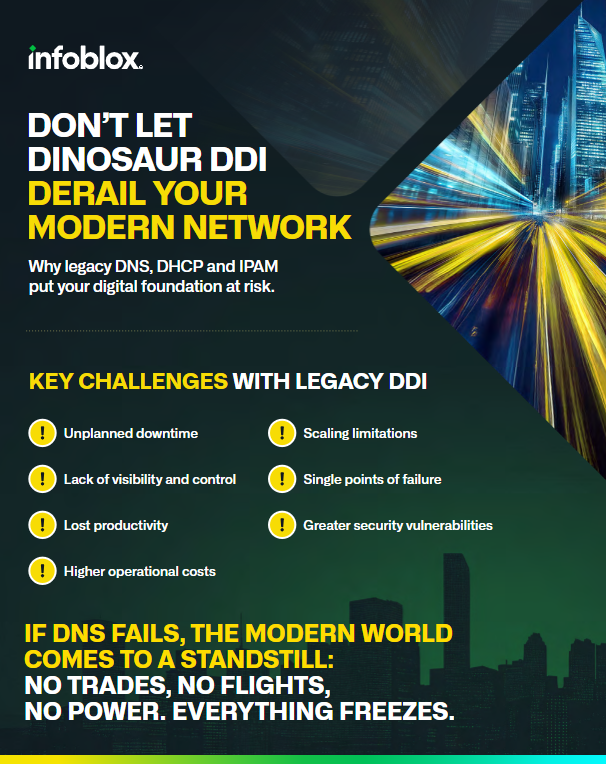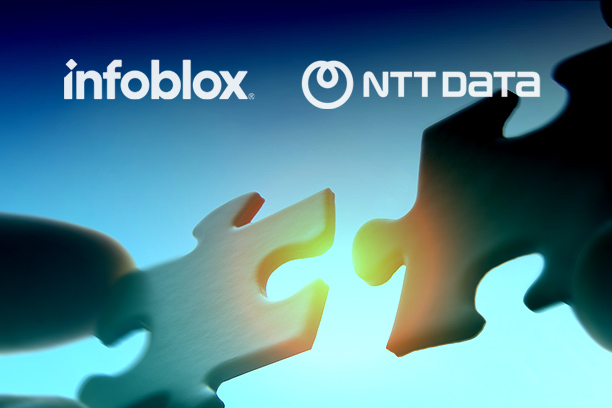If you were designing a state-of-the-art new vehicle—one equipped for next-generation fuel efficiency, autonomous driving and other advanced technologies—would you build it around a 30-year-old drivetrain? Of course not. But that’s effectively what many organizations are doing right now as they launch network modernization initiatives without first modernizing the DNS, DHCP and IP address management (DDI) services that form the foundation of all digital operations.
In the past, organizations could usually get away with yesterday’s “good enough” approaches to managing those critical network services. But in a world where network outages crash financial systems, freeze airports and health systems, and cost millions in lost revenues and fines,1 “good enough” just isn’t enough.
So, what should a modern “enterprise-grade” approach to DDI look like? Recently, Infoblox published Don’t Build Your Tomorrow on Yesterday’s Critical Network Services: Modernization, Automation and Security Depend on Enterprise-Grade DDI to answer that question.

The Cost of Clinging to Legacy DDI
All modern business applications, and all the networks and users depending on them, rely on DNS and DHCP to stay connected. If DNS services go down or if someone makes an error configuring DHCP, entire business units can go dark. Yet, many organizations still treat DDI services as an afterthought—at least until something breaks. As our new publication details, one global retailer who learned this the hard way, when a DNS sync failure on its aging Microsoft infrastructure brought down point-of-sale systems at over 100 stores, costing $7.5 million in lost revenue in just three hours.
Beyond outages, legacy DDI approaches often require dedicated headcount for maintenance, patching and troubleshooting, increasing operational complexity and costs. They also typically lack any real-time, authoritative view of IP address usage across the hybrid, multi-cloud environment, with many organizations still relying on manually updated spreadsheets. This fragmented visibility and control over foundational network services creates a long list of headaches, including:
- Longer timelines troubleshooting network issues and slower service restoration
- Delays identifying endpoints compromised by cybersecurity incidents
- Challenges demonstrating compliance and maintaining audit trails
These network issues present constant challenges to the security, stability and agility of the business. They also make it much harder to use modern DevOps and automation tools—undermining many network modernization efforts before they’ve even begun.
The Case for Enterprise-Grade DDI
If you’re embarking on digital transformation for initiatives like hybrid cloud, Zero Trust or edge computing and AI, you’ll have your pick of new cloud-native applications to help. But overlook the critical network services that those applications run on, and you won’t see the results you expect.
So, what constitutes an enterprise-grade DDI foundation that’s aligned with the needs of today’s hybrid, multi-cloud organization? There’s a clear formula. It starts with a unified platform for centrally deploying and managing DNS, DHCP and IP address management services within a single management workflow. From this unified platform, organizations can take advantage of:
- Unified, API-based automation of DDI operations across the organization to accelerate deployments and reduce manual effort and errors
- Holistic real-time visibility across the complete hybrid, multi-cloud environment
- Flexible deployment options, including physical, virtual and infrastructure-free “as-a-service” options, to meet diverse organizational needs
- Role-based access to reduce risk and simplify regulatory compliance and audits
- Improved security posture by using DNS to strengthen cybersecurity defenses
Organizations adopting enterprise-grade DDI see dramatic improvements in operational efficiency and resilience. They report more than 60 percent improvement in productivity performing DDI tasks, including faster cloud deployments, thousands of personnel hours saved annually maintaining the network and millions of dollars saved from retiring legacy DDI infrastructure.
Building for the Future
Infoblox, the longtime industry leader in managing and securing critical network services, set the standard for enterprise-grade DDI with Infoblox Universal DDI™ Product Suite. After years of helping customers in every industry modernize their networks, we know what organizations need to succeed in today’s rapidly evolving digital landscape. By providing holistic hybrid, multi-cloud visibility, unified management, automated network operations and strong DNS-based security, Universal DDI enables organizations to innovate with confidence. You can ensure that foundational network services are as agile as the modern applications running on them and ready for whatever the future may hold.
Footnotes
- T. Roush and B. Bushard, Forbes, CrowdStrike’s Massive Global Tech Outage: Airlines, Hospitals, Banks, 911, Governments Impacted. Jul 19, 2024.











